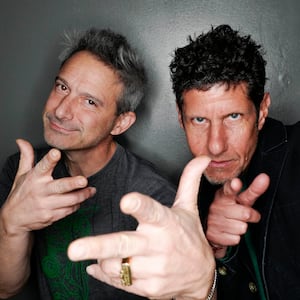Remember Quibi? The mobile-optimized streaming service for attention-deficit entertainment? Well, it seems like it has finally found a niche. Sports documentaries have recently become a focal point in television programming, particularly now that docuseries are widely available via streaming. ESPN has so far been at the forefront, with its 30 for 30 series and, most recently, The Last Dance. But Quibi is making a bold entrance onto the scene with Blackballed, a 12-part 8-minute-episode doc on the politics around ousting former LA Clippers owner Donald Sterling over his secretly recorded racist diatribe in 2013. (Steven Soderbergh and Tarell Alvin McCraney’s High Flying Bird would make a great double-feature with the docuseries.)
Blackballed looks into the state of race and worker politics in the NBA, a league defined by dynamics between white billionaire owners and mostly black players/workers who grew up poor or working class. These dynamics recall the social and—to some degree—economic realities of U.S. slavery and its immediate aftermath (this is also true for the NFL), which obviously persist in the present day. Blackballed approaches the issue mainly from the point of view of the Clippers team at that time, including stars like Chris Paul and Blake Griffin (though Griffin does not appear in the doc), as well as DeAndre Jordan, Matt Barnes, and JJ Redick.
When TMZ released a recording of the married 83-year-old Donald Sterling saying, on a tape recorded by his young black and Mexican girlfriend, V. Stiviano, that he didn’t want her publicly associating with black men, especially not Magic Johnson, the U.S. erupted (in the recording, Sterling wrongly identifies Stiviano as white and/or non-black Latina). Here was an old white man doing what old white men are expected to do in this country: Let the overt plantation-era racism seep out. But as Blackballed makes clear, as a real estate developer, Sterling had a history of racism—and not just the mouthy, easily reproachable kind. The NBA was simply able to get away with ignoring the more insidious, systemic racism Sterling had already perpetuated since it didn’t directly touch the wealthy.
Reigning over the question of black excellence in sports is white supremacy itself, broadly construed. Like President Donald Trump, Sterling practiced housing discrimination, rejecting applications from black and brown tenants and refusing to upkeep or repair their apartments when they did manage to move in. As a basketball owner, he presided over black players like an owner not just of their game, but of their bodies, petting them and commenting on them; he even held “white parties” with scenes resembling Jordan Peele’s Get Out as majority black players were trotted out in front of elderly, wealthy, white guests for photo ops.
Clippers Coach Doc Rivers—who came to fame as the coach of the Kevin Garnett-led Boston Celtics—also participates in the documentary, providing a crucial perspective as a black NBA coach and thus the rare black man with a direct line and responsibility to white management in the NBA. (Currently, of 30 teams, there are 8 black coaches, with Rivers being the winningest, having led the Celtics to a championship win over Phil Jackson’s Lakers in 2008.) This also meant that not only did Rivers answer, in some way, to Sterling, but also to the then-new NBA Commissioner Adam Silver, and the other 30-odd NBA owners, overwhelmingly white, who were Silver’s bosses.
This is to say that no amount of “black excellence” determines what the NBA is—the white and wealthy do (this would include the demographics of the majority of people who are able to regularly attend basketball games in person). But Blackballed presents a more optimistic story, one where players, when they act collectively and with a commitment to social justice, can challenge power and win.
This narrative, with limits, is perhaps true on its face, but the series—perhaps unintentionally—brings the very question of what justice truly is to the fore. Is justice cooperation with the commissioner, or is it true dissent? Is it a T-shirt protest, or a full-on boycott? Nice management that doesn’t say anything racist aloud, or a league cooperatively owned by the players and coaches? Blackballed offers a lightning bolt of testimony into a quickly disposed-of controversy. Including a cohort of talking heads who used to write and report for several now-defunct or gutted publications and networks, the Quibi series makes you long for a renewal of well-funded sports journalism that understands that the politics are precisely the point.


